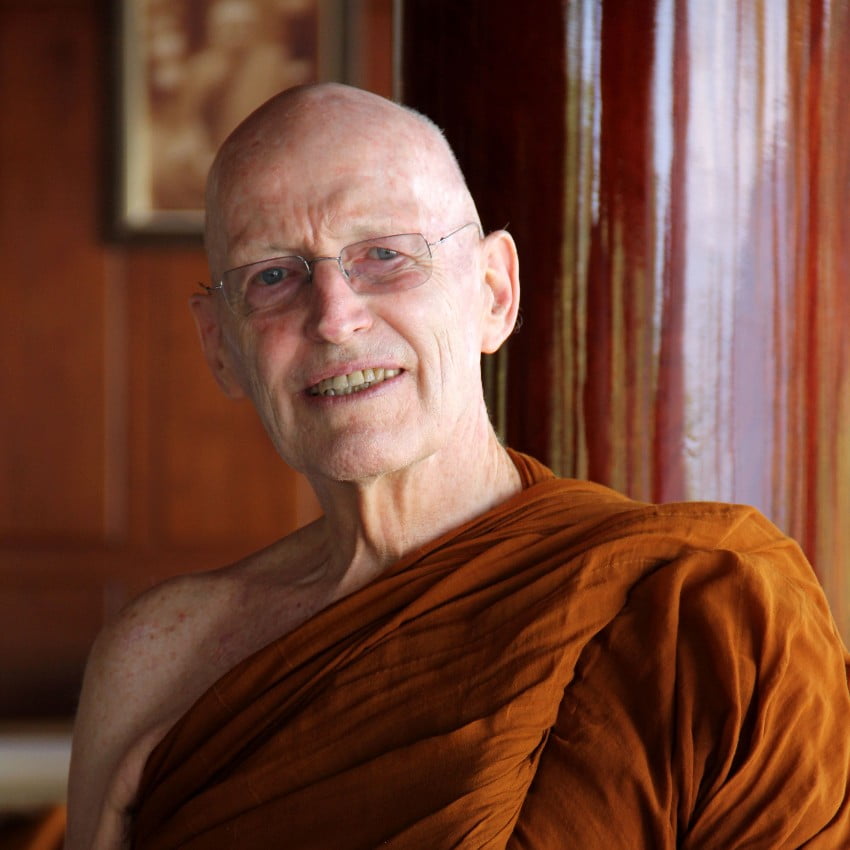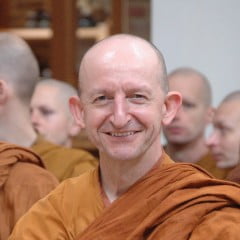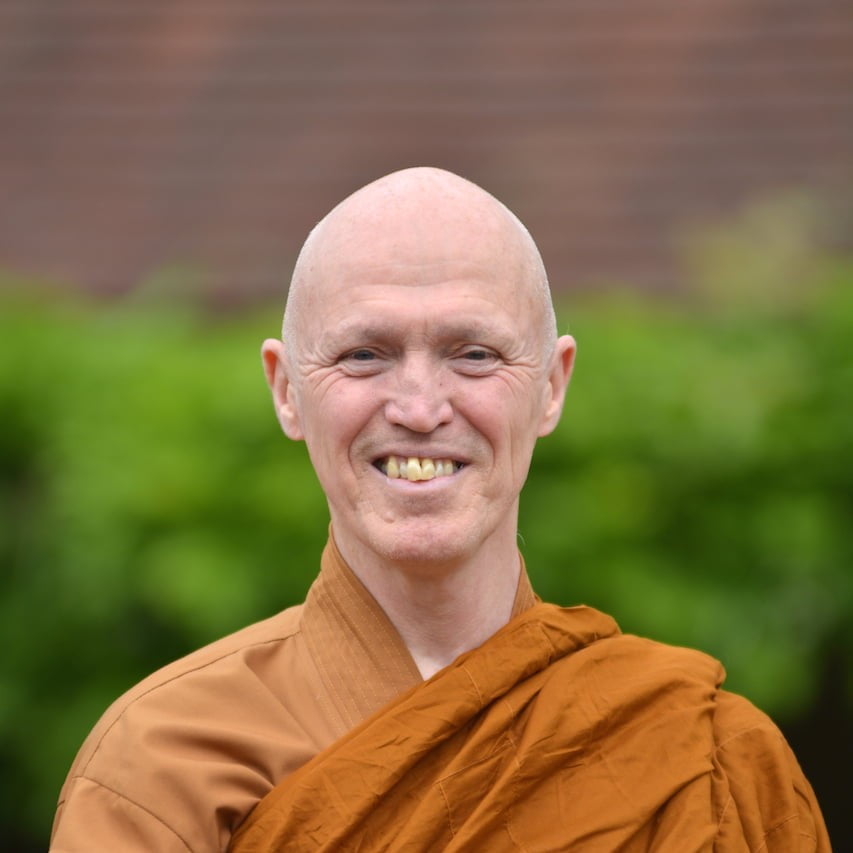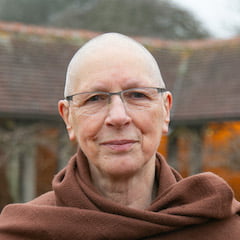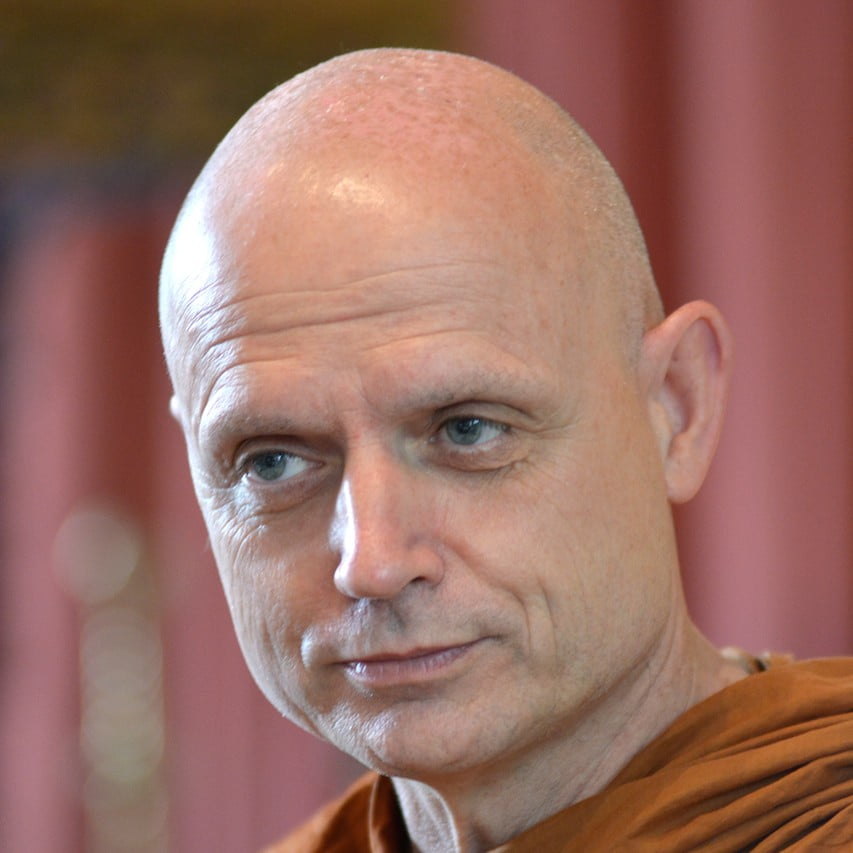In this winter’s retreat, the month of January has passed and a new month begins in the silence, the cold weather, the stillness of winter. Whether the retreat is organized for us to be meditating as a group or alone, being the listener, the witness to the way it is, is the important issue. We’re not trying to get or get rid of anything but to just be the neutral observer, the Buddho, the witness to the way things are. This is bhāvanā – the Pali word for meditation and for developing the Eightfold Path. During these days, many of... Skaityti daugiau
My name is Amaro Bhikkhu, I am a Buddhist, I am concerned about justice peace and the integrity of creation because all of these are seriously at risk in these current times. In Buddhism our vision of justice comprises nonviolence, truthfulness, a respect for the lives and property of others, and an appreciation of the laws of cause and effect. All of these qualities are benefited by the presence of mindfulness, a caring attunement to the time, the place and the situation. Peace is understood to come from not... Skaityti daugiau
A talk given at The Humanities Center, Ho Center for Buddhist Studies, Stanford University, California, on November 7th, 2018 When we consider Buddhism and Mindfulness – what are the prospects? What are the challenges? What can we look forward to? What direction are they heading in? My first response is ‘Good question!’ The future is unknown. It is uncertain but we can possibly see various trends that are already taking shape. There are projections that we can make into the future. One small caveat that I would make is that sometimes things that seem to be obvious trends in a... Skaityti daugiau
LEGENDA: – Arhat, Arahat, Arahant – „ten, który zniszczył wrogów (skazy)”, godny, jeden ze stopni świętości (Ariya) na ścieżce do wyzwolenia, – Bodhisatta (zapis palijski), Bodhisattwa (skr.) – istota dążąca do Przebudzenia – sutty (zapis palijski), sutry (zapis sanskrycki) – teksty kanoniczne Ajahn Amaro zastanawia się nad argumentami za i przeciw dotyczącymi ideałów arhata i bodhisattwy, które określają i zbyt często dzieląbuddyjskie tradycje. Sugeruje drogę wyjścia ze spolaryzowanej dyskusji. Pewien uczeń spytał: „Która ze ścieżek jest najlepsza: ta arhata czy ta bodhisattwy?”. „Takie pytanie jest zadawaneprzez ludzi, którzy nic nie rozumieją z buddyzmu!” – odpowiedział Ajahn Sumedho. „Nie bądź arhatem,... Skaityti daugiau
This is the half-moon Observance Day, and we have the opportunity to reflect on Dhamma, the way it is. For each one of us, the way it is right now is going to be different: with our own moods, memories, thoughts, expectations or whatever. When we try to compare one person with another, we get confused because we’re all different. On the level of saṅkhāras, or conditioned phenomena, everything is different. Nothing can stabilize into a permanent quality or condition; it’s beyond the ability of saṅkhāras, which by their very nature are changing. The Buddha taught, ‘Sabbe saṅkhārā aniccā –... Skaityti daugiau
The Practice of Mettā by Luang Por Sumedho There is a great lack of mettā in the world today because we have overdeveloped our critical faculties: we constantly analyze and criticize. We dwell on what is wrong with ourselves, with others, with the society we live in. Mettā, however, means not dwelling in aversion, but being kind and patient even to what is bad, evil, foul or terrible. It’s easy to be kind to nice animals like little kittens and puppies. It’s easy to be kind to people we like, such as sweet little children, especially when they are... Skaityti daugiau
Doom, Destruction, Death, Decay This journey is involved with pain, with loss, as well as with pleasure and with gain. This realm isn’t a realm that we create out of our fantasy life; this realm is the way it is — it’s all about birth and death, about coming together and about separating, about arriving and departing, about having good health and losing it, about being young, attractive and so forth and then then losing it. Separation, loss is the experience of a human lifetime. These are messengers. This is not a grim description of life, but it’s pointing... Skaityti daugiau
During this period of the coronavirus pandemic, and the worldwide lockdown of millions of people, great acts of self-sacrifice are being carried out all around us. Nurses and doctors, carers of many kinds and support staff, have literally died for their patients in numerous countries and thoughtful acts of kindness and unselfishness are reported daily. Just here at Amaravati it is deeply touching how so many you, our friends and supporters, although unable to bring offerings in person to the kitchen and to receive our usual blessings and expressions of ‘Sādhu anumodanā!’, still make sure deliveries of food and other... Skaityti daugiau
So, the world has changed, we’re in lock-down, and Dhamma practice continues with heightened focus. COVID-19 just marched in. I just got back to Cittaviveka from a retreat in the Netherlands; one of the last creatures on Noah’s New Ark after my train was cancelled, a flight to replace it was cancelled and another flight promptly arranged by the tireless, unflappable, and matter-of-fact compassionate retreat manager. As the retreat contained people from New Zealand, Australia, Israel, Germany, Austria, Switzerland, Denmark, the Netherlands, Finland, the UK, Ireland and the USA, there was quite a lot of rearranging to do. The teachers... Skaityti daugiau
These are frightening times. The uncertainty and stress in the air on account of the coronavirus pandemic is palpable and, at least for our human family, life as we know it has been radically disrupted. Furthermore, the menace of that disruption continuing is like an ominous fog ahead of us on the road – we have no idea how thick it really is and for how long it will continue. The Buddha called such threats – specifically those of ageing, sickness and death – ‘Devaduta’, ‘Heavenly Messengers’, which might seem a very odd name to use for them. Surely these... Skaityti daugiau
The need to have a corrective to the broad assumptions (usually unexamined) of how an economy works has become a real issue for us.’ > Martin Palmer, 1-2-18 This article was written at the request of Martin Palmer, an old friend of this community and the founder and Secretary General of the Alliance for Religion and Conservation, an organization whose chief patron is HRH the Duke of Edinburgh. The ARC recently launched a project, ‘The Faith Consistent Investment Alliance’ (now known as ‘FaithInvest’), to encourage the financial arms of the major world religions to use their resources to support... Skaityti daugiau
I am delighted to be here today in Amsterdam, sharing this time with so many of you; meeting many people for the first time and reconnecting with old friends, continuing to enjoy the meeting of the worlds of academic psychology and Buddhist meditation, and all their attendant branches. The theme for this session is ‘Unshakeable Well-Being: Is the Buddhist Concept of Enlightenment a Meaningful Possibility in the Current Age?’ First of all, I should lodge the caveat that even though the theme of this session includes the word ‘enlightenment’, I make no claims to having realized enlightenment myself. Please don’t... Skaityti daugiau
When the weather is beautiful, we notice how the human mind is influenced and affected by the brightness of sunshine. On a sunny day in England, I always feel that the sunshine brings happiness into people’s minds, and when they’re happy, they seem to get along better naturally. What happens to our minds when the clouds come? When the mind is miserable, it is difficult to connect with people. The Buddha’s entire teaching is about finding a happiness which is different from conventional happiness. Conventional happiness gives way to misery and unsatisfactory experiences. We tend to be experts in conditioned... Skaityti daugiau
We can say that the retreat formally closes this evening; this is the last day. But what really makes today special? The mind creates time, schedules. We come to human agreements. We say ‘beginning’, ‘ending’. These are all qualities that are imputed, determined, agreed upon. They don’t have any existence in and of themselves. As Luang Por Chah said, ‘The things of this world are merely perceptions of our own creation. Having established them, we get lost in them, giving rise to all kinds of trouble and confusion.’ So we say, beginning of a retreat, end of a retreat, succeeding,... Skaityti daugiau
The changing weather is a fine teaching in adaptability. One day warm sunshine, spring flowers, birds singing. Now, howling winds and snow. Tomorrow what will it be? If we are wise then the heart will always adapt to receive the changing qualities of the present circumstance. Stillness and movement, calmness and wind, brightness, darkness, praise, criticism, gain and loss, the familiar or the unexpected. As long as our practice, our peace of mind, is dependent on particular conditions or predictability, having things the way we expect or the way we like, we create the causes of dukkha right there. Why?... Skaityti daugiau
Today is Easter Sunday according to the western European calendar. According to Christian mythology this is the day Jesus rose from the dead, however, the very word ‘Easter’ itself points to the fact that its symbolism reaches beyond the Christian stories. The east is where the sun rises. The birth of the light of the world happens in the east. This time of the year, spring is the reawakening of the land. Flowers come out, leaves start budding and life comes back into the world. Animals start pairing off, building nests. It’s the time of life being reasserted, coming out... Skaityti daugiau
Today there is beautiful weather. We notice how the human mind is influenced and affected by the brightness of sunshine. On a sunny day in England, I always get the feeling that the sunshine brings happiness into people’s minds. It feels like there is something radiant in the air, and it makes me think that probably many people have a very happy mind right now, which I share with them. I think it’s a very natural thing, and everybody gets along better when we are happy. When the mind is miserable, it is difficult to connect with people. In fact,... Skaityti daugiau
Last week at the Spirit Rock family retreat we saw many young people, surrounded by wholesome structures and examples, and offered much in the way of skilful guidance. Seeing the good results of that in just a few days made me reflect on the idea that if you catch things early and have an influence at the beginning, as something is setting out and taking shape, then a small influence can go a very long way. The lessons that people learn and examples that are internalized early on can affect us very deeply. This works the same way with our... Skaityti daugiau
I’ve always regarded Ajahn Buddhadāsa, along with Luang Por Chah, as one of my primary teachers. I could relate to their way of teaching because it was so direct and simple. Ajahn Chah wasn’t intellectual at all – he hardly ever wrote anything – he always emphasized paṭipadā, practice. He said, “In Thailand monks read too much. They learn Pāli and Abhidhamma, but they don’t ever practice.” So he was trying to fill in a gap there by emphasizing paṭipadā. In the 1960s Tan Buddhadāsa was very controversial in Thailand. He wrote a book called Tua Goo Khong Goo, which... Skaityti daugiau
Well, I think you’re doing it at this center. It is a special place. Thai people are open, they want to know. I’ve seen significant change in the many years I’ve been connected to Thailand, especially in the middle class. People aren’t content with just old traditional Buddhism. There is this very pure tradition, it’s very strong in Thailand. Buddhism does tend to get bogged down in ceremonies and traditional forms – not to put that down, because that kind of preserves the religion itself – but now is a time when Thai people, I think, are ready to develop... Skaityti daugiau
Our emotions can be triggered by something very small: a physical sensation, a passing thought, a sense contact, a feeling. In the context of Dhamma we begin to notice that in fact emotions are constructs: amalgams of thought, feeling, perceptions, past conditioning, trauma, family stories; all these things come together to generate emotions. Sometimes we are in a situation where for no apparent reason we start crying, or we become angry or confused. When we search for a reason but can’t find one, we may think there is something wrong with us, that it’s our fault. We make ourselves miserable... Skaityti daugiau
Here is the watch my mother gave my father on their wedding day, his initials engraved upon the back. Here is a dress that the daughter of Tan Dhammarakkho, Hannah Renshaw, wore before she died at the age of two, in a mysterious fire at Chithurst in 1983. Here is a thimble belonging to Chris Smith’s great-grandmother … all precious relics, family treasures. Now we enshrine them on the slopes of Mount Kailash and walk away, climbing the final slope to the Dolma La pass, leaving family and the rest of our past behind. Breathe. Keep breathing deeply. Breathe as... Skaityti daugiau
As I remember, the majority of the teachings that Ajahn Chah gave were not particularly or startlingly profound. They didn’t consist of things that you’d never heard of before, where you would say, ‘Wow – esoteric Buddhist teachings in the forest! If I hadn’t come here I would never have had the opportunity for this kind of initiation, or this kind of unheard revelation of the Dhamma.’ Instead, it was more that every single word he said struck home. It was as if we were hearing those teachings for the first time, but at the same time it wasn’t new... Skaityti daugiau
‘Don’t be an arahant, don’t be a bodhisattva, don’t be anything at all – if you are anything at all you will suffer’ — Ajahn Chah A student of Buddhism asked: ‘Which do you think is the best path: that of the arahant or that of the bodhisattva?’ Ajahn Sumedho replied: ‘That kind of question is asked by people who understand absolutely nothing about Buddhism!’ One of the larger and more significant elephants in the living-room of Buddhism in the West is the uneasy and often unexpressed disparity between the classically stated goals of the Northern and Southern schools.... Skaityti daugiau
I am the Way and the Truth and the Life; no one comes to the Father except through me. > > [John 14:6] A number of years ago I was invited to join with Father Laurence Freeman OSB to co-lead an evening of reflections at Old St Mary’s Cathedral, San Francisco. This was something of a follow-up to the seminar entitled ‘The Good Heart’ which HH the Dalai Lama had led in London in 1994, when he was invited by the World Community for Christian Meditation to give commentaries on the Gospels. Father Laurence had hosted and chaired that... Skaityti daugiau
One of Luang Por Chah’s most well-known teachings is that of letting go. And one of the key phrases that he used to explain what letting go means, and how it is to be developed, is that we should let go ‘within action’. This immediately reminds us that letting go is not a refraining from action, not passivity, but that the letting go takes place within the action itself. As monks and nuns in this Thai Forest Tradition, we may sometimes find ourselves accused of attachment to the Vinaya, attachment to a discipline. This is a difficult accusation to refute.... Skaityti daugiau
